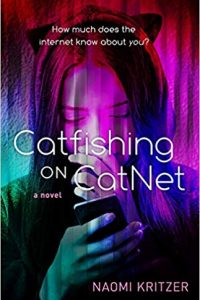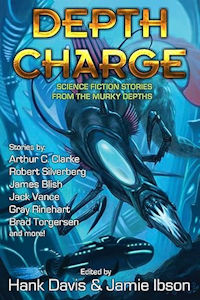Gary K. Wolfe reviews James Morrow
In the first chapter of James Morrow’s picaresque fable of Darwinism Galápagos Regained we learn that our heroine, Chloe Bathurst, is a successful actress in potboiling Victorian dramas with titles like The Beauteous Buccaneer, The Last Days of Pompeii, and Lanterns on the Levee. This not only becomes a recurring plot point as Chloe repeatedly draws on her theater experience in devising the various schemes and hoaxes that propel her through her subsequent adventures, but it also gives us a clue as to what to expect in Morrow’s own loony romantic plot, with its unlikely coincidences, hairsbreadth escapes, characters popping up out of nowhere when needed, and large-scale stage effects, like a fake volcanic eruption and a full-scale replica of Noah’s ark built by Peruvian Indians. Before it’s over, we will also encounter a fast-talking American con man who has built an island empire called Duntopia (a ‘‘pinnacle of diminished expectations,’’ with the Book of Mormon chosen as its gospel simply because of its dullness); a daring French balloonist who might have been borrowed from Jules Verne; a time-warped hookah-den in Constantinople whose patrons from the future include Gregor Mendel, Teilhard de Chardin, and Rosalind Franklin; a group of Peruvian Huancabamba Indians whom Chloe tries to pass off as the Lost Thirteenth Tribe of Israel; and of course Charles Darwin himself. In short, there is a great deal of stuff going on in Galápagos Regained, and while it doesn’t always hang together seamlessly, it’s never less than provocative and entertaining. For readers who might find the opening chapters a tiny bit slow, rest assured that by far the funniest parts of the novel come in the second half.
Written in an ironic version of the arch narrative voice of much Victorian fiction, complete with brief chapter abstracts in the table of contents, the novel rests heavily on the shoulders of the idealistic yet endlessly resourceful Chloe, whose overall goal is to save her lovable but dissolute father from debtor’s prison. Her concern for social justice prompts her to spontaneously step out of character during a performance and lecture the audience, and soon after that she’s looking for work. The new job turns out to be as a kind of zookeeper for Charles Darwin’s menagerie of specimens, many brought back from the Galápagos Islands. Chloe becomes fascinated with Darwin’s ideas – so far only written down in a short unpublished manuscript (this is prior to 1850, and On the Origin of Species is still nearly a decade off) – so when she learns of a contest offering £10,000 for anyone who can prove or disprove the existence of God, she figures Darwin’s ideas of natural selection – passed off as her own – could win her the prize and bail out her dad.
But it turns out the contest sponsors also offer research grants, and have already funded a trip to Mount Ararat to discover Noah’s Ark. Chloe persuades them to fund her own expedition to the Galápagos to find the ‘‘tree of life’’ which will show that God is not needed for evolution, and the expedition – which involves surviving a shipwreck, joining a trading expedition up the Amazon, briefly getting involved in the South American rubber wars (the episode that seems least fully integrated), hitching an airship ride over the Andes, and eventually making it to the Galápagos with the help of those native Peruvians and their ark – is the core of the story. But Chloe and her companions are racing against two other expeditions: the search for Noah’s Ark (which will presumably prove the existence of God), and a second expedition to the Galápagos, sponsored by Darwin’s later nemesis Bishop Wilberforce, whose goal is to wipe out all the lizards, snakes, and birds that might lend credence to Darwin’s theories.
This is fabulist historical fiction not unlike how John Barth approached it in The Sot-Weed Factor, and its outlandish plot developments are anchored by the sheer likeability of Chloe and the other characters, including her irresponsible gambler brother, a love-smitten vicar-turned-atheist, and a castaway wild woman, picked up en route, who becomes Chloe’s acolyte. Interestingly, Darwin himself is the least romanticized figure in the book, coming across as distant and even a bit chilly when Chloe first meets him. That may be because his ideas turn out to be as much a hero of the tale as Chloe herself, particularly the idea of speciation as represented on the Galápagos Islands, which is discussed at some length and with admirable clarity almost throughout the novel. Morrow is not unfamiliar with the classic science fictional notion of using ideas as heroes – he did it in The Last Witchfinder and The Philosopher’s Apprentice – and his title Galápagos Regained, suggesting both Darwin and Milton, certainly calls attention to this. But I can think of few authors who would try to cast a deeply intellectual psychomachia in the form of a wildly comic picaresque tall tale, and fewer still who could get away with it and have so much fun in the process.








